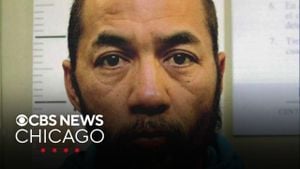Once again propelled by the Netflix series, the story of Erik and Lyle Menendez has unleashed passions reminiscent of its initial frenzy back in the 80s. After being sentenced to life imprisonment for the gruesome murder of their parents, the brothers have recently returned to the courtroom to advocate for their potential release.
On August 20, 1989, Lyle, then 21, and Erik, only 18, invaded their Beverly Hills home, armed with shotguns, and killed their millionaire businessman father, José Menendez, and their mother, Mary Louise 'Kitty'. Initially called by their sobbing sons, the police discovered the horrifying scene: their parents were shot multiple times. The brothers, who had been living lavishly, tried to deflect suspicion by hinting at organized crime connections. This narrative quickly fell apart when tapes of their confessions to their therapist came to light, changing the investigation's focus dramatically.
Their attempts to deny the murders quickly crumbled. Recordings from therapy sessions revealed accusations of long-standing abuse—Erik and Lyle claimed they acted out of fear after years of sexual and emotional atrocities inflicted by their father, whom they described as cruel and narcissistic. Their mother, they alleged, was equally guilty for enabling the abuse.
During their first televised trial—which marked the first time such high-profile proceedings were broadcast—the jury struggled to reach a unanimous verdict. The trial was sensational, captivated by the shocking claims revealed by the brothers. Each witness testimony painted terrifying portraits of abuse and fear, leading to polarized jury opinions. Some jurors were more sympathetic to the brothers’ claims of sexual abuse, especially the female jurors, whereas the male jurors leaned toward viewing the brothers as greedy heirs motivated by their parents’ wealth.
Two years later, the brothers were tried again, with dramatically less media attention. This time around, Lyle was barred from testifying due to revelations about his attempts to manipulate the trial's outcome through emotional theatrics. The lack of compelling evidence against their claims of abuse led to Erik’s testimony dominating the proceedings. Both brothers were convicted of first-degree murder in 1996 and sentenced to life without parole, sparing them the death penalty.
Fast forward to 2024, the case has taken on new life, stirring renewed interest owing to the popularity of two recent documentaries. Menendez + Menudo: Boys Betrayed, aired on Peacock, highlighted allegations of abuse against José Menendez, connecting the brothers' case with broader themes of childhood trauma. It raised questions about whether earlier perceptions of Lyle and Erik might have been misguided or incomplete.
At the same time, Netflix introduced audiences to the psychological depths of the Menendez saga through Monsters: The Lyle and Erik Menendez Story, directed by acclaimed producer Ryan Murphy. With impressive performances from actors like Javier Bardem, who played the abusive father, and Cooper Koch and Nicholas Chavez portraying Lyle and Erik respectively, the series unveiled the family dynamics fraught with turmoil. Many viewers, including notable personalities such as Kim Kardashian, have publicly backed the brothers, citing their challenging pasts and arguing for their release.
Compounded by these developments, the Los Angeles County District Attorney, George Gascón, recently proposed the brothers’ resentencing. He cited their “exceptional” conduct as inmates—engaging positively with other prisoners and pursuing education—as grounds for reducing their sentences to 50 years to life. This change would open up immediate eligibility for parole, showcasing how the perception of their original crimes is being reassessed twenty-five years later.
At the latest hearing, which occurred on November 25, 2024, the court postponed its decision on the resentencing request until January 2025, reiterations of procedural delays energize supporters of the Menendez brothers even more.
Indeed, the recent shifts within the sociopolitical environment since the #MeToo movement has encouraged more open discussions about childhood abuse and trauma, leading to heightened scrutiny of this notorious case. Advocates argue for increased recognition of the effects of long-term emotional and psychological trauma, asserting Lyle and Erik’s stories reflect broader societal issues.
The Menendez brothers’ perseverance through their lengthy legal saga continues to grab headlines. Their case encapsulates significant aspects of the American criminal justice system, particularly how narratives of abuse and self-defense are received. The upcoming hearings may very well determine if the Menendez brothers will finally get the chance to challenge their convictions head-on.
Whether one believes they are deserving of forgiveness or remains convinced they are murderers driven by greed, the Menendez brothers remain sterling representatives of the complex interplay between victimization and perpetration. The public continues to cling to this captivating saga, driven by both thick courtroom drama and increasingly complex family histories.



